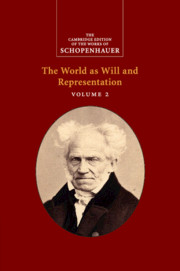Chapter 47 - On Ethics
Published online by Cambridge University Press: 30 June 2022
Summary
Now there is a large gap in these supplements because I already dealt with morality in the narrower sense in the two prize essays published under the title The Two Fundamental Problems of Ethics, and, as I have already mentioned, I am assuming that the reader is familiar with these essays so as to avoid needless repetition. Thus what remains to be presented is simply a small epilogue of isolated remarks that could not be articulated in the earlier essays, where the principal theme of the contents was prescribed by the Academies; least of all was I able to include any remarks that would require any standpoint higher than the one shared by all, and so this is where I was forced to remain. Thus it will not surprise the reader to find these remarks in a very fragmentary arrangement. These in turn are continued in the eighth and ninth chapters of the Second Volume of the Parerga. –
That moral investigations are incomparably more important than physical ones, indeed than all others, follows from the fact they concern the thing in itself almost directly, that is, they concern the appearance in which, immediately touched by the light of cognition, the thing in itself reveals its essence as will. Physical truths on the other hand remain entirely within the purview of representation, i.e. of appearance, and show merely how the lowest appearances of the will present themselves in representation in a lawful manner. – Further, the results gathered from considering the world from the physical side will offer us no solace, however broadly and cheerfully such an investigation is pursued: solace comes from the moral side alone, since here the depths of our own inner being come into consideration.
My philosophy is however the only one that grants morality its full and complete rights: for a human being's deeds really only belong to and are attributable to him if his essence is his own will, which makes him, in the strictest sense, his own work. On the other hand, as soon as he has a different origin or is the work of a being other than himself, all of his guilt falls back onto this origin or author. Because ‘acting follows from being’.
- Type
- Chapter
- Information
- Schopenhauer: The World as Will and Representation , pp. 604 - 617Publisher: Cambridge University PressPrint publication year: 2018

